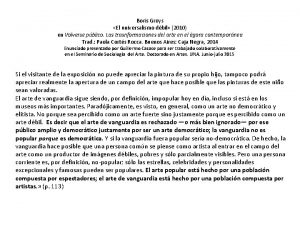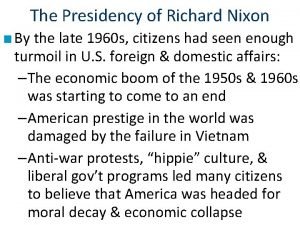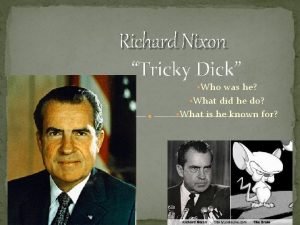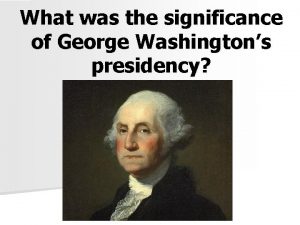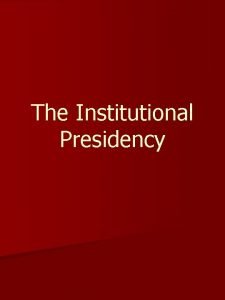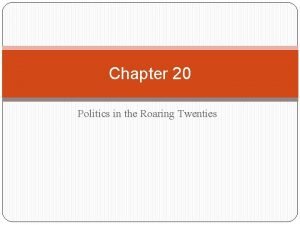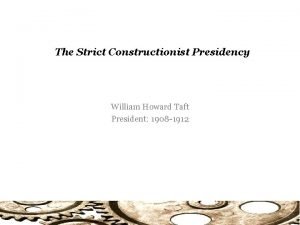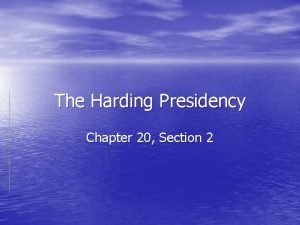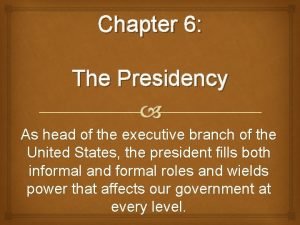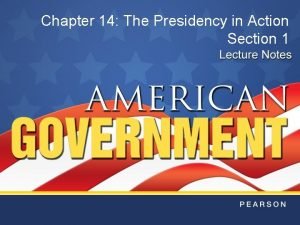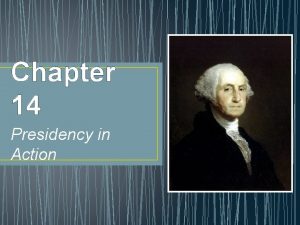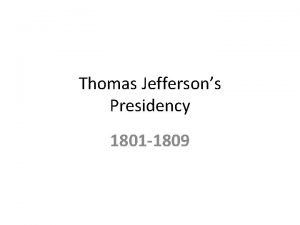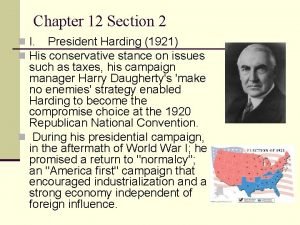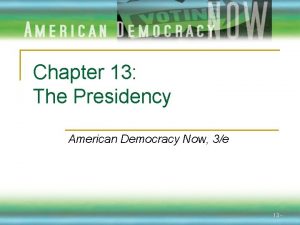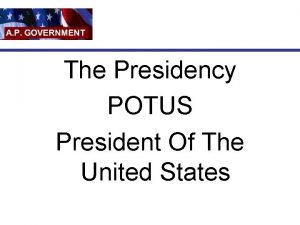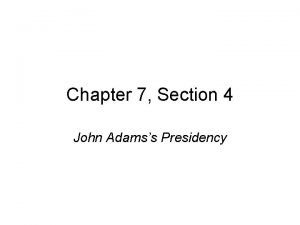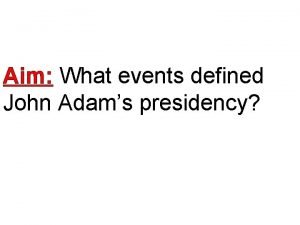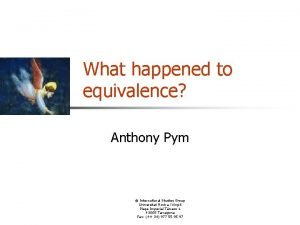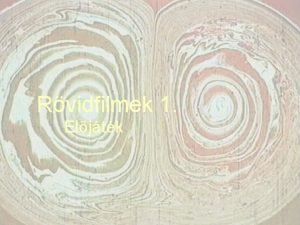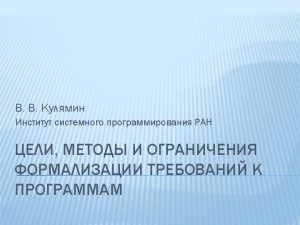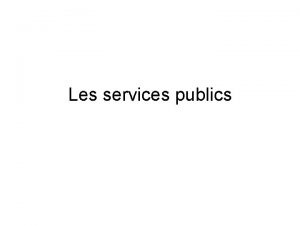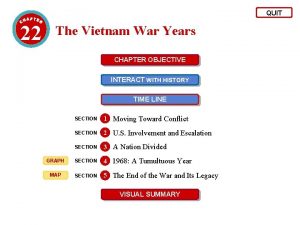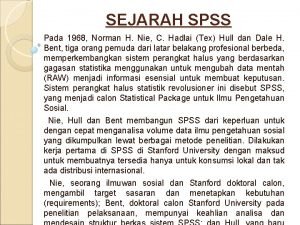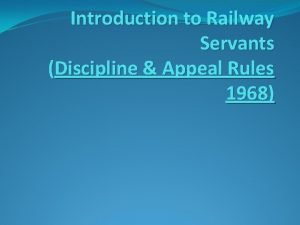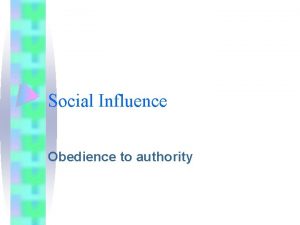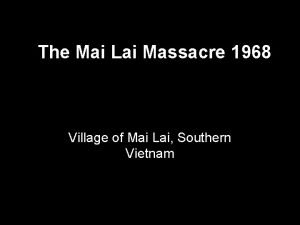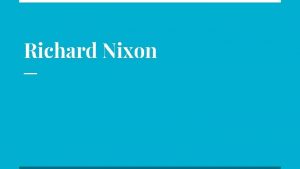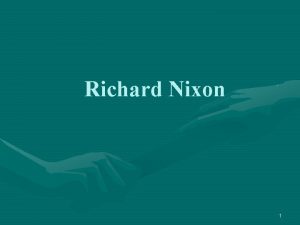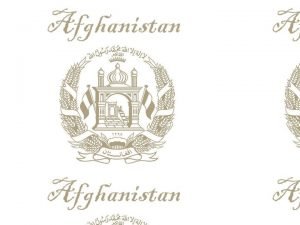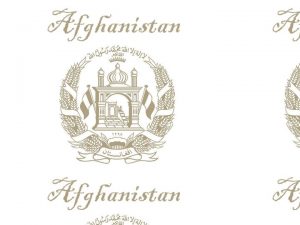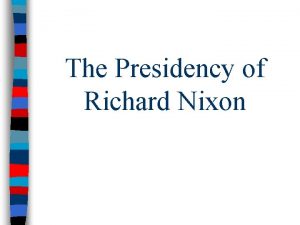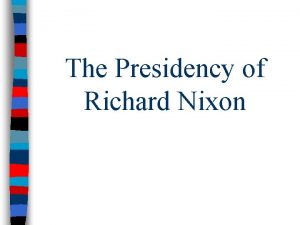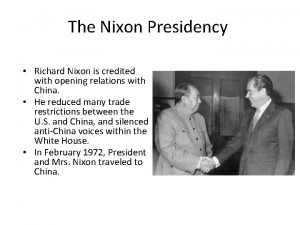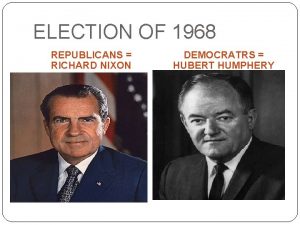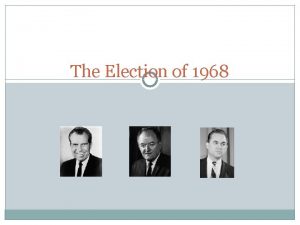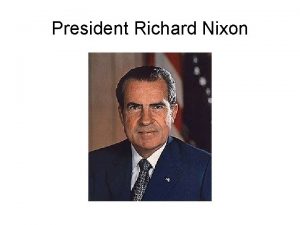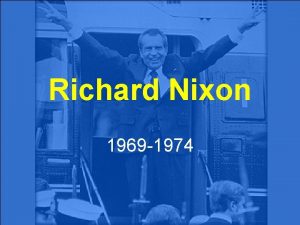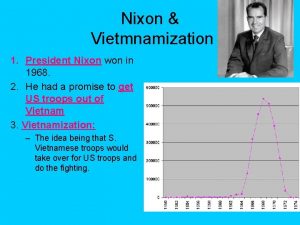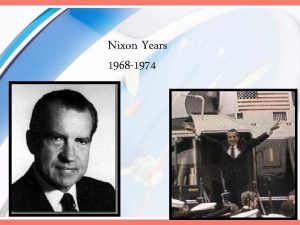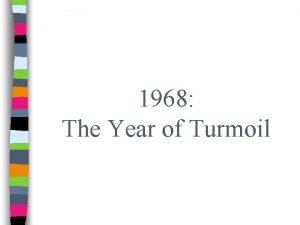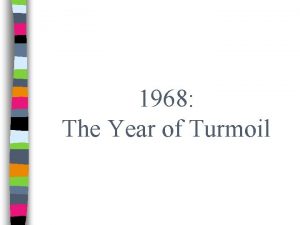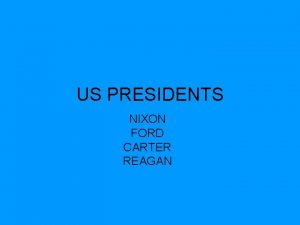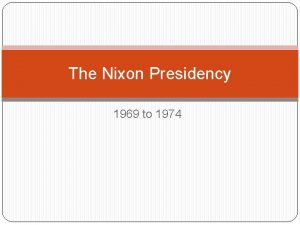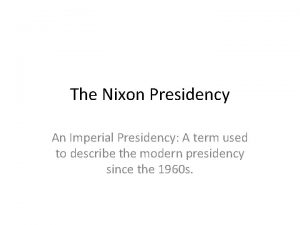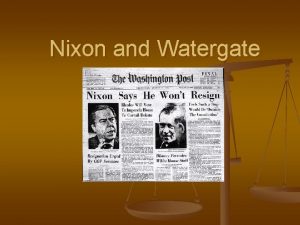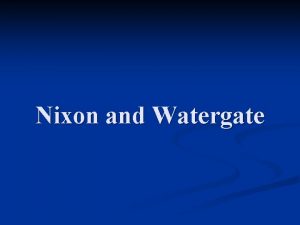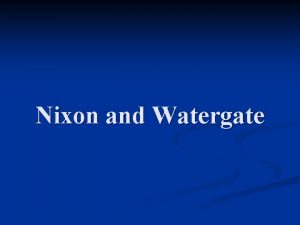The Nixon Presidency 1 Election 1968 l Richard









































- Slides: 41

The Nixon Presidency 1

Election 1968 l Richard M. Nixon won the election because of the support of the silent majority. l Silent Majority- “the forgotten Americans, the non-shouters, and non-demonstrators. ” l Nixon won their vote by promising to restore law and order. 2

Southern Strategy l This was an attempt to win the support of white southern Democrats and other opponents of civil rights reforms. l Ex. Nixon opposed (against) busing programs to desegregate public schools. l After Nixon appointed more conservative Supreme Court justices some civil right 3 decisions were refused.

Economy in trouble l In the early 1970’s the United States was suffering from stagflation. l Stagflation- a period of high inflation and high unemployment. l The Vietnam War and social programs had put the U. S. into debt. l Also, America faced stronger foreign competition. 4

New Federalism called for a program called “New Federalism” l Under this system, the federal government would give grants to the states. l Local leaders would then decide how to use it. l Nixon 5

Energy Crisis l Scarce energy resources and rising oil prices led to U. S. economic problems. l By 1974 the United States was imported more than 1/3 of our oil. l The oil came from: – Venezuela, Saudi Arabia, Iran, Iraq, and Kuwait. 6

OPEC l All oil producing countries formed the Organization of Petroleum Exporting Countries or OPEC. l The goal of the group was to control oil prices and keep oil prices high. l The oil producing countries and the U. S. had a disagreement about Israel, which led to an embargo on the sale of oil to the U. S. 7

OPEC Countries 8

Energy Crisis Effects l Fuel Shortages l Higher Fuel Costs l Increased Stagflation l Research into alternative energy sources 9

Foreign Policy l Foreign Policy was based on the idea of realpolitik. l Realpolitik- practical politics or favoring U. S. interests over defending political or moral ideals overseas. l Many people complained about this because it led to the U. S. support of dictators who violated human rights. 10

Foreign Policy l In 1972, Nixon visited China and became the first president to visit Moscow. Nixon in China Nixon in Moscow l The leader of both the U. S. and U. S. S. R decided that the nuclear arms build-up was too costly and signed the Strategic Arms Limitation Talks (SALT) 11

12

SALT This agreement slowed the arms buildup and limited the numbers and types of long-range nuclear missiles each country could have. l This led to détente or easing of tensions between the two countries. l Some supported Nixon forming closer ties with communist governments, other Americans criticized. l 13

Conclusion l Richard Nixon had been successful in foreign and domestic policy…. but this would not last for long l Now on to the Watergate Scandal………. . 14

WATERGATE!!! l As Nixon’s second term begins, rumors of a scandal start around Washington D. C. l Let’s start at the beginning. . . 15

STAGE 1: THE WATERGATE BREAKIN l Saturday, June 17 th, 1972, Frank Wills discovered a piece of tape over a basementdoor lock in the Watergate apartment and office complex in Washington D. C. l The night watchman removed the tape and went to get a cup of coffee. When he returned less than an hour later he found the lock had been re-taped. 16

STAGE 1: THE WATERGATE BREAKIN l The night watchman suspecting a burglary called the police. l The police confronted 5 burglars in the offices of the Democratic National Committee. l The burglars wore business suits and carried: – Cameras, walkie talkies, lock picks, surveillance equipment. 17

18

STAGE 1: THE WATERGATE BREAKIN l Come to find out these men worked for CREEP l CREEP (Committee to Re-Elect the President) l They were in the Watergate Complex to install electronic bugging equipment in telephones that would have transmitted Democratic campaign strategy back to CREEP. l. THE WATERGATE BREAK-IN 19

20

STAGE 1: THE WATERGATE BREAKIN l Most newspapers ignored the break-in or downplayed the event. 21

STAGE 2: INVESTIGATION BEGINS l In the early days of the investigation of the break-in hardly anyone in the country suspected a direct link between the break-in and the White House. l Two young reporters Carl Bernstein and Bob Woodward from the Washington Post slowly began to connect Nixon’s advisors to the cover-up of the burglary. 22

Bernstein and Woodard 23

STAGE 2: INVESTIGATION BEGINS l In September 1972, two White House aids and the 5 burglars were charged with the crime. 24

STAGE 3: CONGRESSIONAL HEARINGS l In March of 1973 the grand jury sentenced the burglars to 20, 35, and 40 years in prison. l In May the Senate got together and held hearings to further investigate Watergate. l The hearings were televised and many Americans watched with great fascination. 25

STAGE 3: CONGRESSIONAL HEARINGS l During the hearings the following was revealed: – Nixon had installed a taping system in the White House to record all conversations. 26

STAGE 3: CONGRESSIONAL HEARINGS l The new question: What did the president know? When did he know it? l Could this be answered by listening to the tapes? l The government immediately asked for the tapes, but Nixon refused stating it was an issue of national security. l However, Nixon eventually turned over the 27 tapes.

STAGE 4: THE SECRET TAPES l When Nixon finally turned over the tapes to the judge, some of the conversations were missing. tape had a mysterious gap of 18 1/2 minutes. l The gap was blamed on Nixon’s secretary who stated she accidentally erased the tape. l However, her description of what happened 28 would only account for 5 minutes. l One

29

STAGE 4: THE SECRET TAPES l This still left 13 and 1/2 unaccounted for. 30

STAGE 4: THE SECRET TAPES l Two months (1974) later another 64 tapes were requested and although Nixon refused the Supreme Court ruled 8 -0 he had to turn over the tapes. 31

STAGE 5: NIXON RESIGNS l In July 1974 President Nixon was impeached (or brought to trial). l These last 8 tapes provided the “smoking gun” or irrefutable evidence that Nixon had knowingly violated the law and that he had known about and had participated in the cover up of the Watergate break-in from almost the very beginning. 32

STAGE 5: NIXON RESIGNS l Even members of Nixon’s own Republican party stated he was guilty and they could no longer afford to have him as a liability. 33

STAGE 5: NIXON RESIGNS l Rather than face being forced from office, Nixon resigned on August 9 th, 1974. l He climbed into the presidential helicopter and turned and gave one last victory salute to his staff, and flew to political exile in California. l “Some of my judgements were wrong, but I acted in what I believed at the time to be the best interests of 34 the nation. ”

35

36

37

l. Why is Watergate such an important historical issue? 38

l. What do you think was the impact of Watergate on how the public perceives the presidency and politicians? 39

l. Do you think Nixon’s actions were much different from those of most politicians? 40

l. Should Nixon’s presidency be judged more on his accomplishments or the Watergate Scandal? l. Why? 41
 Richard serra splashing 1968
Richard serra splashing 1968 Richard nixon
Richard nixon Tricky dick
Tricky dick Richard iii and looking for richard
Richard iii and looking for richard What was the significance of george washington's presidency
What was the significance of george washington's presidency Institutional presidency definition
Institutional presidency definition George washingtons presidency
George washingtons presidency Chapter 20 politics of the roaring twenties
Chapter 20 politics of the roaring twenties Constructionist presidency
Constructionist presidency Chapter 20 section 2 the harding presidency
Chapter 20 section 2 the harding presidency Are executive orders informal powers
Are executive orders informal powers Chapter 6 section 1
Chapter 6 section 1 Chapter 14 the presidency in action
Chapter 14 the presidency in action Which trend characterized thomas jefferson's presidency?
Which trend characterized thomas jefferson's presidency? Chief of state examples president
Chief of state examples president Thomas jeffersons presidency
Thomas jeffersons presidency Chapter 12 section 2 the harding presidency
Chapter 12 section 2 the harding presidency American democracy now 5th edition
American democracy now 5th edition Presidency line of succession
Presidency line of succession Section 4 the presidency of john adams
Section 4 the presidency of john adams Xyz affair summary
Xyz affair summary Kohlberg 1968
Kohlberg 1968 Bernie boston
Bernie boston Edwin locke goal setting theory 1968
Edwin locke goal setting theory 1968 Otto kade 1968
Otto kade 1968 Introduccion de la matanza de tlatelolco
Introduccion de la matanza de tlatelolco Glanzer and cunitz
Glanzer and cunitz Paris mai 1968
Paris mai 1968 He is the author of icnofalangometrica.
He is the author of icnofalangometrica. Mélyvíz 1970
Mélyvíz 1970 Software crisis 1968
Software crisis 1968 Tc 24 juin 1968 société distilleries bretonnes
Tc 24 juin 1968 société distilleries bretonnes Aydan şener miss turkey
Aydan şener miss turkey Club of rome schulen deutschland
Club of rome schulen deutschland 1967 1968 1969 1970 1971 1972 1973 1974 1975 1976
1967 1968 1969 1970 1971 1972 1973 1974 1975 1976 Chapter 22 section 4 1968 a tumultuous year
Chapter 22 section 4 1968 a tumultuous year Spss 1968
Spss 1968 Railway discipline and appeal rules book
Railway discipline and appeal rules book Orne and holland
Orne and holland Spaulding 1968
Spaulding 1968 Mai lai village
Mai lai village Fluorid
Fluorid
